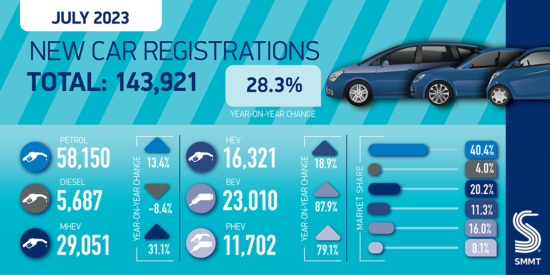July UK sales of new cars mark 12 months’ continuous growth

The new car market grew 28.3 per cent in July with 143,921 new vehicles registered, according to the latest figures from the Society of Motor Manufacturers and Traders (SMMT). As a result, the market has enjoyed non-stop growth for a full year despite challenging economic conditions, as supply chain challenges ease, production increases and deliveries can be fulfilled.
This was the best July performance since 2020, when pent-up demand for new cars was unleashed following three months of lockdown during the pandemic. Despite this continuous growth, however, the overall market year to date remains behind pre-pandemic levels.
Company registrations drove the growth, as uptake by large fleets increased 61.9 per cent to 80,961 units and business registrations rose 28.7 per cent to 2,915 new vehicles. Private demand remained stable at 60,045 units (up 0.3 per cent).
Electrified vehicles accounted for more than a third (35.4 per cent of the market). Hybrid (HEV) volumes grew, although their overall market share fell to 11.3 per cent. Plug-in hybrid (PHEV) registrations saw a significant uplift for the second month in a row as uptake rose 79.1 per cent to account for 8.1 per cent of the market. The biggest increase, however, was for battery electric vehicles (BEVs), which recorded an 87.9 per cent increase to account for 16.0 per cent of all new registrations for the month, a market share broadly consistent with that seen so far this year.
The demand for battery electric cars was such that a new one was registered every 60 seconds in the month. Furthermore, according to the latest market outlook published today, this will accelerate to one every 50 seconds by the end of the year, and up to one every 40 seconds by the end of 2024.
While the growth in electric vehicles hitting UK roads is significant, it must move even faster if it is to outpace the rest of the market and enable the UK to meet ambitious but necessary environmental targets. To get even more consumers to make the switch, every means of support must be provided, from fiscal incentives to purchase reassurance – and, most obviously, in ensuring drivers have full confidence that they will be able to charge wherever and whenever required, sustainably and affordably.
There were positive signs on this over the last quarter, as a record high of 3,056 new standard public chargers were installed. This was equal to one new charger for every 35 new plug-in vehicles registered, a significant improvement on the same quarter last year, when the ratio was one for every 58 cars.
However, as government, chargepoint operators and the automotive industry all agree, reassuring drivers means building ahead of need. To reach the government’s minimum target of 300,000 chargepoints by 2030, the installation rate must treble to almost 10,000 chargers per quarter, every quarter. This can only be achieved if the obstacles to installation so commonly cited – arcane planning regulations, competing pressures on local authorities and delays to grid connections – are overcome. An overarching strategy, including a chargepoint mandate, is necessary to create the reliable, accessible and affordable charging network consumers deserve.
Mike Hawes, SMMT Chief Executive, said: “The industry remains committed to meeting the UK’s zero emission deadlines and continues to make the investments to get us there. Choice and innovation in the market are growing, so it’s encouraging to see more people switching on to the benefits of driving electric. With inflation, rising costs of living and a zero emission vehicle mandate that will dictate the market coming next year, however, consumers must be given every possible incentive to buy. Government must pull every lever, therefore, to make buying, running and, especially, charging an EV affordable and practical for every driver in every part of the country.”
NFDA reports increased EV switching enquiries
Speaking about the continuing sales growth, Sue Robinson, Chief Executive of the National Franchised Dealers Association (NFDA), which represents franchised car and commercial vehicle retailers in the UK, said: “New car sales have now seen 12 consecutive months of recovery since the pandemic related supply chain shortages. NFDA conducted a flash poll of its members and found that retailers have seen little change in the business environment, with a slight decrease in customer footfall in July. This is likely driven by the unseasonal weather, but continued engagement online demonstrates the importance of omni-channel retailing and a functional digital service to start the customer journey.”
With sales of electric growing, diesel fell from 6,210 units to 5,687 (-8.4 per cent), but petrol has risen from 51,294 units to 58,150 units (13.4 per cent).
Robinson added: “ULEZ has been dominating the headlines in the past month and NFDA’s poll revealed its members have seen increasing customer engagement and enquiries switching to electric. This is reinforced in this month’s figures with extremely positive uptake in electric, year to date market share for all electric categories is now at 35.3 per cent, in comparison to last year’s 31.7 per cent at this stage. NFDA and EVA dealers will continue to engage with its members on ULEZ, as franchised dealers look to find the right vehicle for their customers.
“Looking ahead, the outlook remains hard to predict as a result of inflationary pressures and following yesterday’s announcement on higher interest rates in the UK.”



Comments